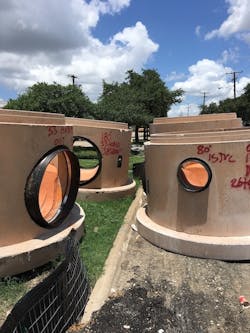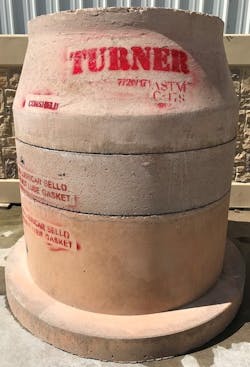Precast Success with Corrosion-Resistant Manholes
Starting in 2012, Turner Co. added a new product to their line of precast manholes that has become a major source of growth. “We started making some of our manholes with an anti-corrosion product called ConmicShield, and after Dallas started specifying it, it really took off,” Anderson explained. “Now there are three more metroplex cities specifying ConmicShield for new manholes—Irving, Rockwall, and Celina—while Fort Worth and a few others are looking at it. One city, McKinney, has specified it for sewer lines with diameters of 18 in. or more. It’s really proving to be a high-quality and cost-effective solution for sewer manholes.”
Cities around the world have learned, to their cost, that conditions common in municipal wastewater systems—warm temperatures, organic matter, turbulence and low oxygen levels—can lead to microbiologically-induced corrosion (MIC), which destroys concrete. These conditions generate hydrogen sulfide gas, the food of various species of Thiobacillus bacteria. Thiobacillus colonies establish themselves on concrete, which is exposed to air, and live by digesting hydrogen sulfide and converting it to sulfuric acid—some species of Thiobacillus can thrive in acidic solutions as concentrated as 78%, which is when the corrosion happens. Sulfuric acid attacks concrete, turning it into crumbly calcium sulfate, also known as gypsum. If conditions are perfect for Thiobacillus, even thick concrete pipes and manholes can be compromised in just a few short months.
For decades, cities have specified some form of anti-corrosion protection in new concrete sewer lines and manholes. In Dallas, until recently, that protection was usually some form of epoxy or polyurethane coating, sprayed on after manholes are installed. “The linings work if they’re applied perfectly and don’t get nicked or damaged any time after application,” Anderson said. “But they’re only an eighth of an inch thick, so damage does happen, and it only takes a small breach for Thiobacillus to get a foothold.” The problem is, even a small opening in the coatings can allow Thiobacillus colonies to form and begin attacking concrete behind the coating. If this happens, a pipe or manhole may look fine on the coated surface, even when inspected, while the concrete substrate behind the coating is being turned to mush by sulfuric acid. Sudden, unexpected sewer failures caused by MIC do happen.
The solution Turner now uses to address MIC is a liquid antimicrobial additive, which can be added to the concrete mix prior to casting to prevent MIC attack of concrete structures. It protects concrete by stopping sulfur oxidizing bacteria (Thiobacillus spp.) from forming and converting the hydrogen sulfide gas to sulfuric acid, which destroys the concrete no matter how dense or water tight it may be. Bonding molecularly with concrete, the additive permanently inhibits the Thiobacillus bacteria that create sulfuric acid from hydrogen sulfide gas.
ConmicShield has been in use for decades, with long term installations conclusively proving that Thiobacillus colonies are permanently deterred by treated concrete. This microbial resistance has also been verified in laboratories.
The Right Mix
Turner Co.’s production of MIC-resistant precast manholes has continued to increase. But this growth wasn’t automatic—substantial effort was required on the part of Turner Co., and on the part of ConmicShield Technologies, the makers of ConmicShield. “When it came to getting ConmicShield approved and specified for use in the metroplex, that was basically all up to them,” Anderson said. “But meanwhile, we were also learning how to use the product effectively.”
That learning process began with a thorough review of Turner’s mix design by ConmicShield Technologies. “Before we started, they wanted to be sure our process was compatible with their solution and they have high standards,” Anderson explained. “I’m happy to say it was, and that we’re very consistent with it.” Another factor was Turner’s emphasis on quality control. The suppliers wanted high standards to be maintained, and it was important that Turner Co. has its own in-house QC department, regularly performing break tests with their own equipment. Outside labs also are used as needed.
Business is looking up. As more and more cities in the Dallas–Fort Worth metroplex begin to specify ConShield as an approved corrosion-resistance measure, Turner Co.’s manhole business continues to grow. And so, for precast plants like Turner Co., the future is bright and corrosion-free.
About the author: Angus W. Stocking, L.S.

